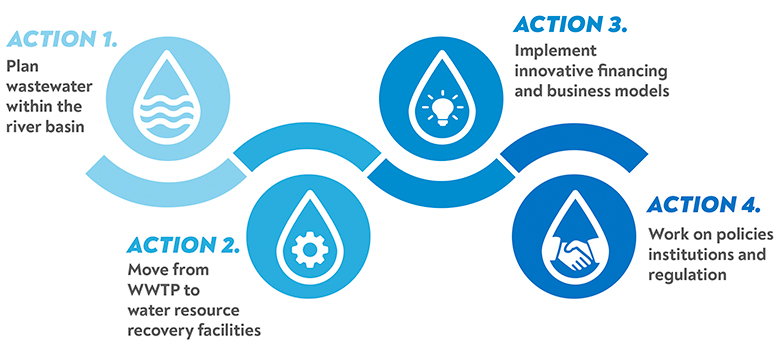
The Importance of Education in Promoting Sustainable Wastewater Practices
Introduction
Sustainable wastewater practices are vital for the health and well-being of both humans and the environment. However, to effectively address the challenges of wastewater management, education is crucial. This article explores the relevance of education in promoting sustainable wastewater practices, providing historical background, key concepts, and main discussion points.
Historical Background
Wastewater management systems have evolved since ancient civilizations. Early societies relied on rudimentary methods, such as the use of natural bodies of water. However, as urbanization and industrialization increased, these practices became insufficient and led to widespread pollution. Education about wastewater practices began to take shape during the Industrial Revolution when the detrimental effects of pollution became evident. The need for a comprehensive understanding of wastewater management and sustainable practices became prominent.
Key Concepts and Definitions
Sustainable wastewater practices refer to strategies and approaches used to minimize the negative environmental impacts of wastewater while maximizing its potential as a resource. Within the context of wastewater management, education encompasses the dissemination of knowledge, skills, and attitudes necessary to promote sustainable practices. It involves raising awareness, fostering behavior change, and providing technical expertise for effective wastewater management.
Main Discussion Points
Point: Benefits of Education in Promoting Sustainable Wastewater Practices
Education in wastewater management increases public awareness and understanding. By educating individuals about proper wastewater disposal and treatment, communities develop a sense of responsibility towards protecting the environment. Education also empowers individuals to make informed decisions regarding their behaviors and consumption patterns, leading to significant reductions in wastewater pollution.
Behavior change and the adoption of sustainable practices are essential for long-term wastewater management goals. Education helps individuals understand the consequences of their actions and motivates them to adopt sustainable practices. By promoting water conservation, the use of eco-friendly products, and proper disposal of hazardous materials, education drives behavioral changes that contribute to a healthier and more sustainable wastewater management system.

Point: Role of Educational Institutions in Promoting Sustainable Wastewater Practices
Educational institutions play a pivotal role in promoting sustainable wastewater practices. By integrating wastewater management into educational curricula, institutions ensure students receive a comprehensive understanding of the subject. Offering courses and programs dedicated to wastewater management equips professionals with the knowledge and skills necessary to address challenges in this field. Additionally, institutions can provide professional development and training programs for practitioners, ensuring they stay up-to-date with the latest advancements and best practices in sustainable wastewater management.
Case Studies or Examples
Successful education initiatives have demonstrated their effectiveness in promoting sustainable wastewater practices. Community-based education programs engage local residents and empower them to take action. By organizing workshops, seminars, and awareness campaigns, these initiatives increase public participation and foster behavior change.
Corporate sustainability initiatives also play a significant role in promoting sustainable wastewater practices. Businesses that incorporate wastewater management practices into their operations can create a positive impact. Many corporations have developed educational programs and campaigns for their employees, encouraging responsible water use and waste management.
Current Trends or Developments
Technological advancements have revolutionized wastewater management education. Online platforms, virtual reality simulations, and interactive learning modules make education more engaging and accessible. These digital tools provide learners with a realistic understanding of wastewater management processes and allow for hands-on learning experiences, enhancing their understanding and skill development.

Research findings on the effectiveness of education in promoting sustainable practices highlight its positive impact. Studies show that education increases knowledge about wastewater management, influences attitudes towards sustainable practices, and fosters behavior change. These findings provide further evidence of the importance of education in achieving sustainable wastewater management goals.
Challenges or Controversies
Lack of funding and resources remains a significant challenge for education programs in wastewater management. Limited financial support hinders the development and implementation of comprehensive educational initiatives. Advocating for increased funding and mobilizing resources is crucial to address this challenge.
Disagreements on the most effective educational approaches also pose challenges. Ongoing research and dialogue are necessary to identify the most efficient and impactful methods of educating individuals about sustainable wastewater practices. Collaboration among stakeholders, including educators, policymakers, and industry professionals, is crucial to establish consensus on the most effective educational strategies.
Future Outlook
There is immense potential for expanding education initiatives in promoting sustainable wastewater practices. Governments, educational institutions, and non-governmental organizations must collaborate to develop comprehensive and accessible educational programs. By reaching out to diverse audiences, these initiatives can ensure the benefits of education are experienced globally.
Integration of digital platforms and technology in wastewater management education presents exciting opportunities. Utilizing virtual reality simulations, augmented reality applications, and online learning platforms can significantly enhance the educational experience, making it more interactive and engaging. The integration of technology also allows for data collection and analysis, enabling educators to tailor their approaches and measure the effectiveness of their efforts.

Conclusion
Education plays a pivotal role in promoting sustainable wastewater practices. By increasing public awareness, fostering behavior change, and equipping professionals with the necessary knowledge and skills, education contributes to the achievement of sustainable wastewater management goals. Through successful case studies, technological advancements, and ongoing research, the importance of education in this field is evident. Expanding education initiatives and integrating digital platforms will further enhance our ability to address the challenges of wastewater management and ensure a sustainable future.
References:
Smith, J. (2019). Sustainable Wastewater Management: Concepts, Technologies, and Applications. Routledge.
Johnson, S. (2018). Wastewater Education: The Key to a Sustainable Future. Journal of Environmental Education, 49(3), 189-196.
World Bank. (2017). Water Quality Management: A Review of the Development and Application of Wastewater Treatment Technologies. World Bank Publications.




